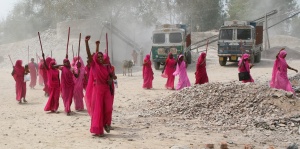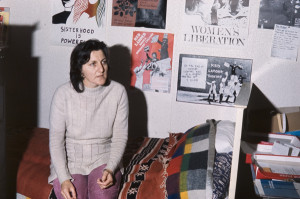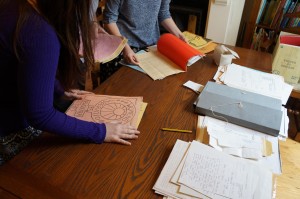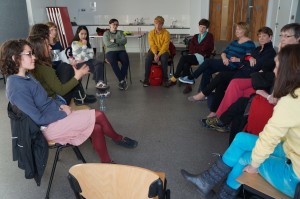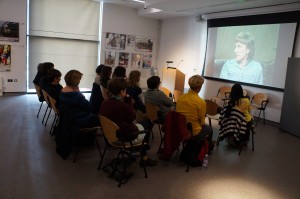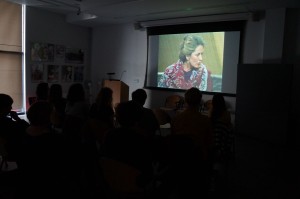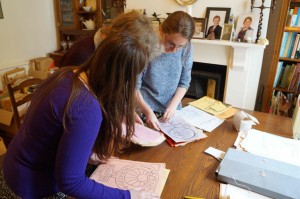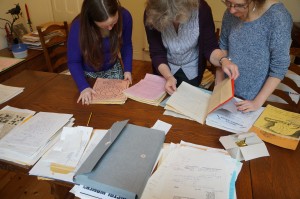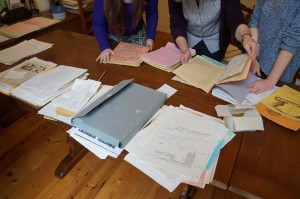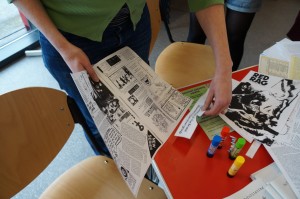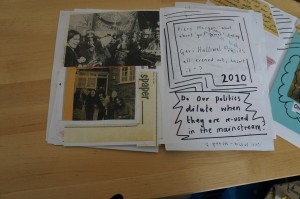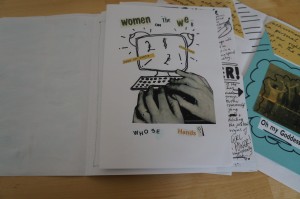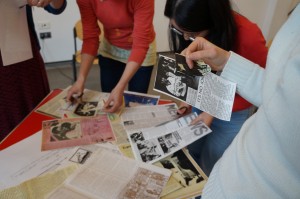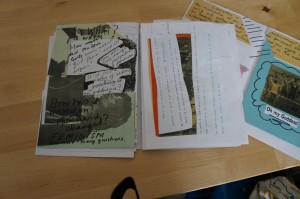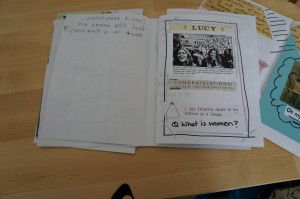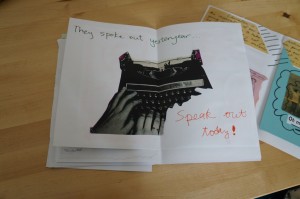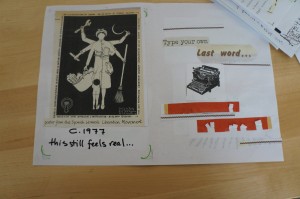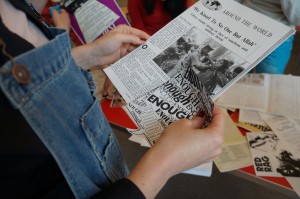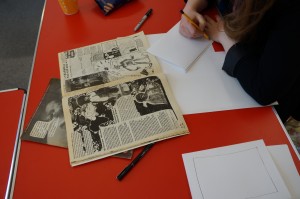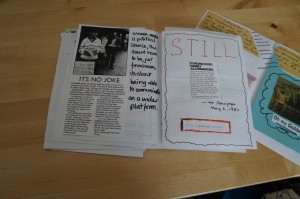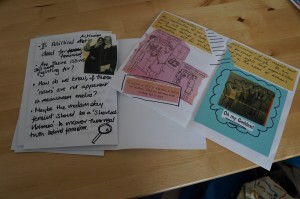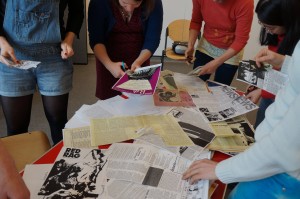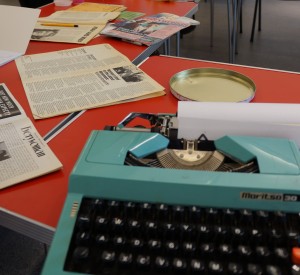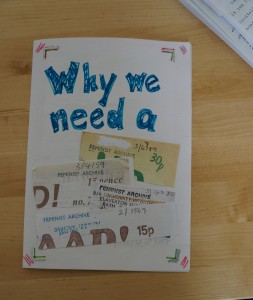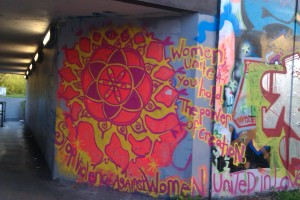The post GULABI GANG – film screening 8 November @ Silai Centre appeared first on Feminist Archive South.
]]>GULABI GANG
Saturday 8th November, Silai Centre, Easton Road, Doors open from 6pm, film starts at 7pm
Suggested donation £3
Nishtha Jain, a film maker from India will be visiting Bristol on 8th November for a very special screening of her latest film, Gulabi Gang, a documentary about an inspirational group of women working in Northern India to challenge gender violence and state corruption.
Please join us for this exciting screening and unique opportunity to learn about the activism against gender violence happening in India at the moment.
*GULABI GANG*
Norway/India/Denmark/2012/Hindi with English Subtitles
A film by Nishtha Jain(India), produced by Oscar and Emmy nominated
Torstein Grude(Norway) and Signe Sorenson(Denmark)
*Synopsis*
Enter the badlands of Bundelkhand in central India and you have entered a
place of desolation, dust and despair. This film follows the Gulabi Gang,
an unusual group of rural women led by the energetic and charismatic Sampat
Pal. They travel long distances to fight for the rights of women and
Dalits. Often they encounter resistance, apathy and corruption, even
ridicule. Sometimes whole villages connive against them to protect the
perpetrators of violence. While we see Gulabi Gang members struggling
against gender violence and state corruption, we also see the flip side –
members getting sucked by the trappings of their new found power. Breaking
away from the deep-rooted patriarchal structure is a challenge even for the
most fearless amongst them. The film pulls us into the centre of these
blazing conflicts and uncovers a complex story about the nature of power
itself.
*AWARDS AND HONORS*
Best Documentary, Dubai International Film Festival, 2012
Best Documentary, Kortfilmfestivalen, Norway 2012
Amnesty International Award for Human Rights, Planete-doc Review, Warsaw
First Amnesty International Human Rights Award, Tri-Continental IFF, South
Africa 2013
Best Documentary, International Association of Women in Radio &
Television(IAWRT) 2013
Best Director, Mumbai International Film Festival, Mumbai, 2014
Best Documentary(Social Issues), National Awards, India, 2014
Best Non-feature Editing, National Awards, India, 2014
Best Protagonist, ImagineIndia, Madrid 2014 & many more!
*Nishtha Jain* is an award winning filmmaker based in Mumbai. She has directed several films including the critically acclaimed
*City of Photos(2005)* and *Lakshmi and Me(2008). *She’s a graduate of
FTII, Pune and Jamia Mass communication Research Centre.
http://www.raintreefilms.net
http://www.lakshmiandme.com
The post GULABI GANG – film screening 8 November @ Silai Centre appeared first on Feminist Archive South.
]]>The post Final Workshop – Bristol Women’s Aid: Saturday 20 July, MShed, 1-5pm appeared first on Feminist Archive South.
]]>The majority of Ellen’s activist life is dedicated to the ongoing struggle to end Violence Against Women.
For the final workshop in this series, Ellen is joined by colleagues who helped develop vital services to protect and support vulnerable women in Bristol and the UK.
Drawing on material from Ellen’s Archive we will look at the history and development of Bristol Women’s Aid and link it to the wider national context.
We will explore questions such as:
- How and why did the Women’s Liberation movement come to support women and their children who were experiencing violence within the home, and to build an autonomous movement against it?
- How has it now become supported by local and national governments ?
- How did Bristol Women’s Aid begin and what did it do?
- How did things change after the early 1970s?
- Where are we now?
The post Final Workshop – Bristol Women’s Aid: Saturday 20 July, MShed, 1-5pm appeared first on Feminist Archive South.
]]>The post Feminist Archive South Workshops in June appeared first on Feminist Archive South.
]]>Sunday 9th June – 1 to 5pm
Bristol: Voices from the Women’s Liberation Movement facilitated by June Hannam and Kath Holden from the West of England and South Wales Women’s History Network.
Most women took part in ‘second wave feminism’ at a grass roots, local level. How do we find out why they became involved and what they hoped to achieve? Can we recover their voices and, if we do, how can we interpret them?
This workshop will look at different ways that historians can try to recover women’s voices. The first part will look at documentary evidence, including newsletters, pamphlets and photographs. The second part will focus on oral testimony: participants will be invited to compare summaries, full transcripts and original recordings of interviews. The workshop will explore memory and the ways in which participants construct different stories of the movements in which they took part.
June Hannam is an emeritus professor and Kath Holden a visiting research fellow in history at the University of the West of England. They are co-chairs of the West of England and South Wales Women’s History Network. They both have research interests in gender history. June Hannam specialises in labour and feminist history and Kath Holden in oral history and history of the family.
Recent publications include Katherine Holden: The Shadow of Marriage: Singleness in England, 1914-1960 (2007) and June Hannam, Feminism (2012).
Tuesday 18th June – 7 to 9.30pm
Film Showings & collective listening to songs by women inspired by anti-nuclear activism followed by discussion.
Carry Greenham Home (1983)
‘Director Beeban Kidron was so committed to making this 1983 film – she was attending the National Film and Television School at the time – that she lived at the site herself for more than seven months.
Shot almost entirely on video, Carry Greenham Home‘s depiction of the women involved in the peace movement contrasts greatly with media portraits of the time, and the subsequent collective memory.
The film gives a fuller picture of what life was like than the fragmented news reports. It covers the processes underlying the women’s decisions, the influence of outside forces, and the verve and style with which they developed their own brand of non-violent direct action.’ Notes by Charlotte Cooper.
Don’t Trust Menwith Balls (1995)
A film about Menwith Women’s Peace Camp.
Thursday 27th June – 7 to 9.30pm
Archiving contemporary feminist activism with the Bristol Feminist Network.
Feminists and women’s rights activists have often made a strong connection between history and social change. Simply put, when women are written out of the history books, their culture, achievements and lives are seen as less important than men’s. Such a perspective was a motivating force in the creation of the Feminist Archive, and the Women’s (formerly Fawcett) Library in London.
Such facts beg the question: how do we archive the present? How do we ensure that online 21st century feminist activism is documented in a secure way? How do we collect records of a movement as it is happening now, what do we remember, and what do we forget?
As part of the evening we will create a timeline of 21st century Bristol feminist activism, hear from experienced archivists and conduct live oral histories.
Join us for this important conversation! If you want to be part of history, you gotta make it!!
The post Feminist Archive South Workshops in June appeared first on Feminist Archive South.
]]>The post Photos from recent workshops appeared first on Feminist Archive South.
]]>The post Photos from recent workshops appeared first on Feminist Archive South.
]]>The post Action Photos from the Feminist Print Media Workshop! appeared first on Feminist Archive South.
]]>After a brief tour of magazines such as Spare Rib, Shocking Pink, Red Rag and Bad Attitude, newspapers such as Outwrite and Shrew, Enough: The Journal of Bristol Women’s Liberation and Fowaad! the newsletter for the Organisation of Women of Asian and African Descent, we leapt into action and made our own publication.
A trip to a local stationery store is planned to reproduce it, and copies will be available at future workshops!
The post Action Photos from the Feminist Print Media Workshop! appeared first on Feminist Archive South.
]]>The post Archive Workshops – Now Full! appeared first on Feminist Archive South.
]]>Thanks to all who have booked a place and expressed interest – its really encouraging to know that there is an audience and need for these activities, it helps us for future funding bids.
Big apologies though to anyone who has missed out – we promise to run similar programmes in the future.
The post Archive Workshops – Now Full! appeared first on Feminist Archive South.
]]>The post Feminist activism – temporary, invisible, documented appeared first on Feminist Archive South.
]]>Feminist activism can of course take many forms. But it is those activisms which are underground, subcultural and temporary that are particularly at risk from erasure from the history books.
This photo of a vibrant piece of graffiti located at the St Werburghs-St Pauls underpass near the M32 junction taken on 5 May 2013 with a smart phone, encapsulates all these aspects of feminist activism.
It is likely that this image, which has clearly been made to capture the attention, to force passer-bys to look again as the combination of text and colour emits a message of hope and social transformation, will be washed away by the council at some point in the next few days, weeks or months.
It will leave no physical record that can continue to tell the story of how this piece graphic communication intervenes into public space, and defiantly offers an alternative to the messages that are paraded on billboards, encouraging nothing more than a culture of excessive consumption and economic exploitation.
Everyday mobile technologies like smartphones (which of course are intimately bound up with capitalism), are tools to document these brazen messages that offer people the chance to dream, hope, live and create otherwise.
If you see other examples of feminist graffiti, please send them in and we can share them on this site.
The post Feminist activism – temporary, invisible, documented appeared first on Feminist Archive South.
]]>The post Archivist Shadowing Workshops – Call for Participants appeared first on Feminist Archive South.
]]>The Feminist Archive South is offering a unique opportunity for people to shadow the project archivist as she catalogues Ellen Malos’ collection.
Ellen Malos was a key figure in the Bristol Women’s Liberation Movement. The first Women’s Centre opened in the basement of her house in 1973, and her work supporting vulnerable women has been recognised through an Honoury Doctorate at Bristol University (2006), and in the naming of the Next Link Women’s Safe House, ‘Ellen Malos House’ (12 June 2007). Ellen’s archive comprises rare historical material, including documents that have shaped some of the most significant legal and policy transformations within British history relating to gender quality.
You can attend up to four sessions with the archivist, and they will take place during weekdays in the day-time. You do not have to attend all sessions – although if you want to, this is also fine!
This is a great chance to informally learn the skills, practices and knowledge required to do archival work. You also get the chance to look at a load of interesting material about feminist history!
Even if you do not want to pursue archiving as a career, these activities will be relevant to people interested in the history of gender equality, in particular activism relating to women’s aid and violence against women.
Sessions will take place from April-June 2013. Please contact us to arrange a session.
Participation bursaries are available to cover things like childcare, travel and accommodation costs (if coming from outside of Bristol). Please let us know about this when you make an enquiry.
The post Archivist Shadowing Workshops – Call for Participants appeared first on Feminist Archive South.
]]>